How to Find and Join a CSA
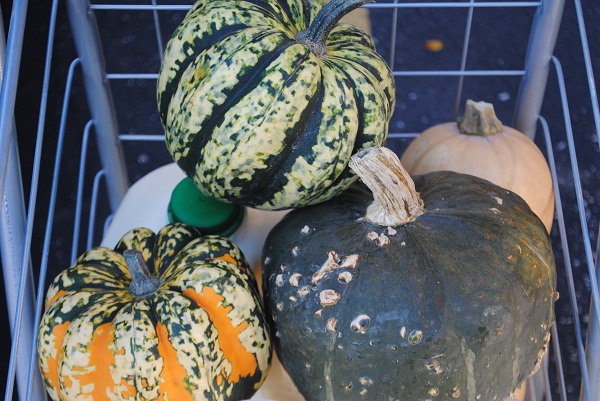
I just published a post about where raw milk comes from and what I went throug to get myself to the point of actually joining a CSA (Community Supported Agriculture) in order to feel assured about the safety (insha’allah) of consuming raw milk products and local organic produce in . You can read that here.
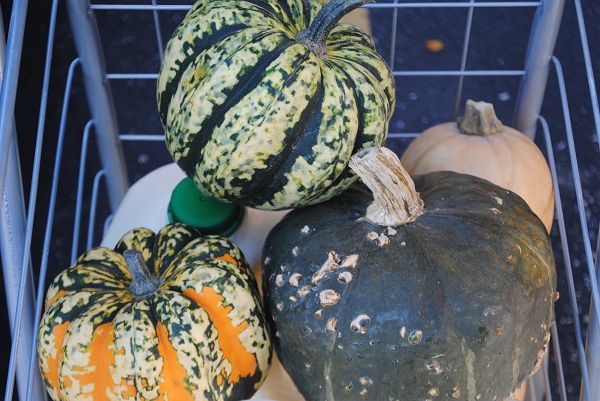
Variety of pumpkin, squash and raw milk from Family Farms Co-op CSA
The questions I often get on this topic are: What exactly is a CSA?, How do I join a CSA?, and Where can I find and buy raw milk?
Legally, in most states here in the U.S., you can only get raw milk if you actually own the cow. In order to get around that law, cow-shares or co-ops were formed so that people could collectively own the cow and it’s milk for the purpose of legally purchasing milk that is not pasteurized.
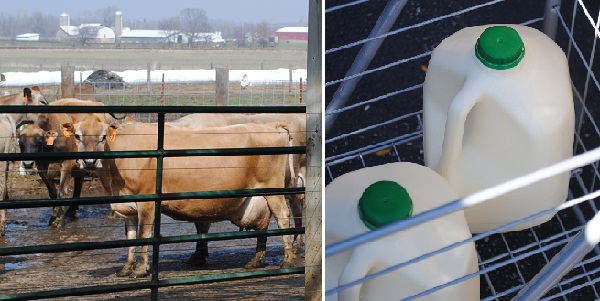
Beautiful Jersey Cows and Their Raw Milk
A CSA, as they are known, is sort of like a club for organic produce and farm-fresh products you won’t find at your local {organic} grocer. Anyone can join one for a set fee (mine is $25 per year) and then order individual items (usually weekly, bi-weekly or monthly) pertaining to the availability of seasonal produce that the particular CSA offers. Many CSAs offer delivery services to members’ homes, but in most cases pick up is at a designated central location.
In my case, after extensive research first on the health benefits and safety of raw milk and then on each CSA in my area, I joined one called Family Farms Co-op. It services four areas of Chicagoland and I am free to pick up in any of the four locations they deliver raw milk products and organic produce, so long as I place my order several days prior to deliver. The crew in charge of the co-op organizes the paperwork for each member and collects the ‘groceries’ so when I arrive to pick up my goods, most of it is gathered for me, aside from the produce so that I can pick out what is seasonal and appealing to me.
Let’s backtrack a moment to talk about how some CSAs work behind the scenes to get the products to its members.
The way mine works is that the folks working for the CSA communicate with their farmers before the scheduled pick up date to see what’s available. In the case of produce, it’s always seasonal and depends what has survived any calamaties in weather or other issues. It probably happens with poultry, as well, since hens are vulnerable to attacks by prey like fox and coyote. In any case, the availability of fresh and variable produce is always announced via email by the director of the CSA to which I belong.
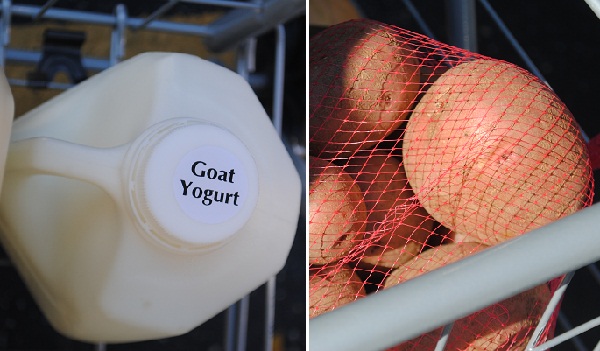
Goat’s Milk Yogurt and Organic Red Potatoes from my CSA
A worker or volunteer from the CSA goes to Indiana and picks up the raw milk and raw milk products like butter, cheddar cheese, kefir and yogurt from an Amish dairy farmer whose products they’ve agreed to source for the CSA. Those products are brought to the delivery location (disclosed only to members) and members arrive on the scheduled pick up day to collect what they’ve ordered ahead of time.
I look forward to my pick-up date. I love going to get my raw milk and knowing the story about from where it came and the farmer who is behind the process. It’s nice to see other people there who have a similar mindset about the importance of supporting these farmers and their sustainable farming practices that take care of the land and their animals so well. It’s nice to see the wholesome and beautiful products waiting for us.
In the case of the CSA I belong to, I am also greeted by farmers of organic produce with their seasonal products displayed and just pick up what I like at the moment, so it isn’t always ordered ahead of time. My CSA also offers meat products, which I don’t buy because they are not dhabiha halal, but they are grass-fed meats like lamb and beef.
Unfortunately, they don’t offer eggs, which is something I would love to have. Free-range and antibiotic-free hen, duck and quail eggs are always something I’m on the lookout for. Many CSAs do offer eggs, so you’ll just have to ask to see their product list.
10 Questions to Ask a CSA Before Joining
- Where do the dairy products come from?
- What is the diet of the cows? Are the cows fed any GMO products? (hay, oats, grass and especially alfalfa might be genetically-modified). Be sure the farmer producing your milk is trying his very best to keep those products away from his cows.
- How clean is the milking facility where the cows are milked and the milk is processed, stored and funnelled into containers?
- Does the milking facility use any animal products (i.e. lard) to clean their equipment? If yes, does this ever come into contact with the milk or other food products?
- If the dairy farmer is making yogurt or kefir, does he add any animal-based gelatin to these products?
- If the dairy farmer is making cheese, is he adding any animal rennet to it? If no, what kind of rennet is added?
- If eggs are offered, are they from free-range and antibiotic-free hens?
- How much does it cost to join the CSA? Is this an annual or quarterly fee?
- Other than the cost of food, are there additional costs associated with joining, such as delivery costs?
- Can I see an example of your product list, price sheet and delivery dates?
If the director of the CSA you are trying to reach seems inaccessible, just be patient and keep trying to reach him or her via phone or email. Most of them are very busy people, working both farms and doing the communication and marketing for the CSA. If he or she is rude to you or doesn’t want to help answer your questions, that is not acceptable. One of the benefits of a CSA is to know about where your food comes from. This doesn’t mean prying into the personal business of farmers and vendors, but it does mean enjoying a high degree of transparency with regards to the ingredients and method used to bring this food to your table.
Most of all, enjoy this experience. Involve the kids. Involve your spouse. Pick up the food together. It’s a learning experience; it’s a teaching opportunity.
I usually go home and make myself a warm sandwich of simply pastured butter and raw milk cheddar cheese melted on top, followed by a large glass of delicious, wholesome and pure raw milk. With cream on top.
Alhamdullilah.
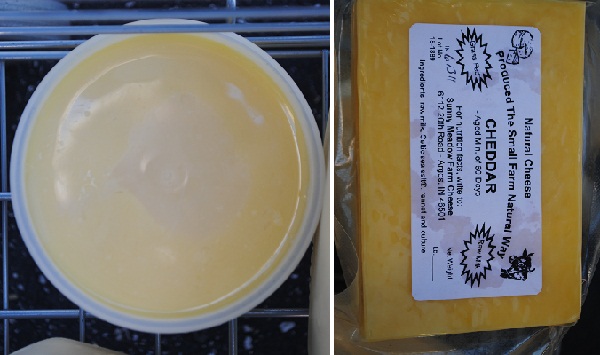
Golden Butter from Pastured Cows and Raw Milk Cheddar Cheese
I know this is a luxury in today’s world, for truly, milk is a whole food mentioned in the Qur’an. I want everyone else to have access to the same thing, insha’allah.
Please, if you can, make use of this information. Pass it on. Share it with your family, friends and neighbors. Tell me about your experiences. I can’t wait to hear about it…
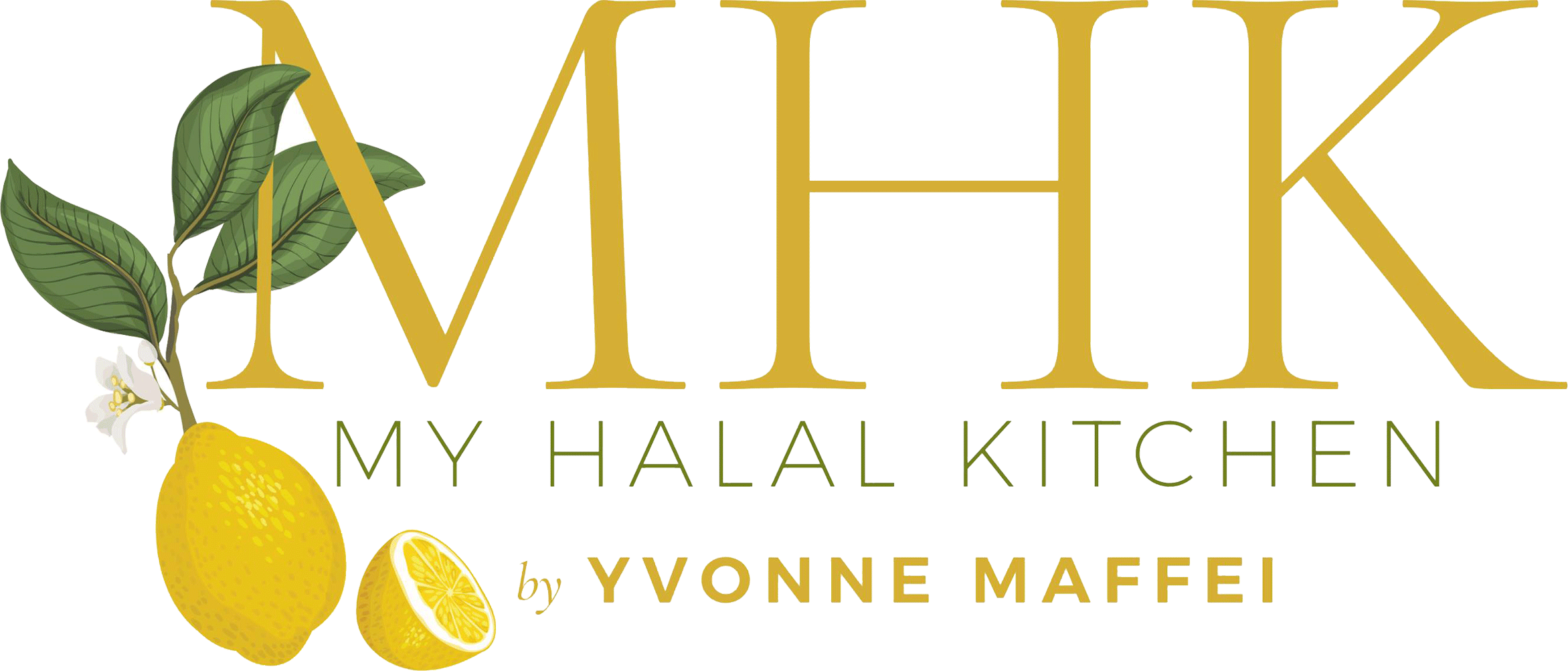

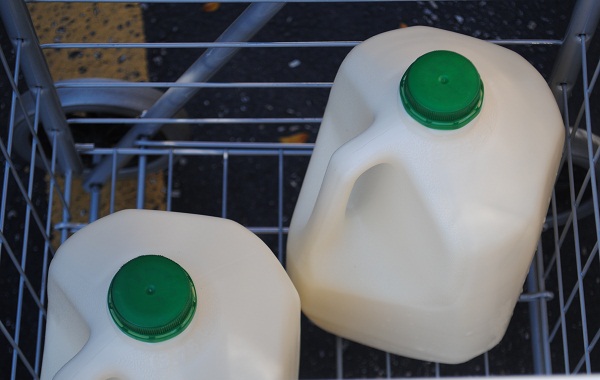

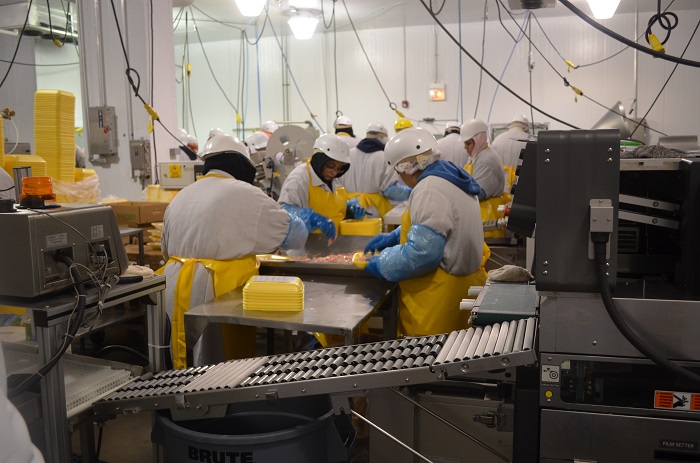



I went to the family farm co op website but I coulndt find info on how to become a member. However, they are raising funds to start selling brown eggs! So you just might start finding them there 🙂
@Amina- if you go to their website’s ‘Contact Us’ page, you can reach out to them and they’ll respond, insha’allah, with details on how the co-op work and answer any questions you might have. Here’s the direct link: http://sites.google.com/site/familyfarmscoop/how-to-contact-us
Nice post. I used to be checking continuously this weblog and I am inspired! Extremely useful info specially the final phase 🙂 I maintain such information a lot. I used to be looking for this particular info for a very long time. Thank you and best of luck.
Is kefir halal. I keep finding conflicting evidence
Salam Alaykum Sister Yvonne,
I recently moved to Tampa FL, and am surprised to see the number of CSA’s here. Its slowly becoming the norm to join one at least in the New Tampa area.
Unfortunately the financial structure of the CSA’s here doesn’t seem to fall within any of the legit halal transactions. The closest I can think of is Baya Al Salam (http://www.islamic-finance.com/item_salam_f.htm). In case of the CSA’s here, the quantity and quality of the produce cannot be defined and fixed, and therefore does not qualify for a Baya al Salam.
I have checked with Mufti Abdullah Nana, who is a trusted authority today, and he has not endorsed it yet. But has acknowledge need for more research into it.
The scenario you have described above is more of a food Co-op where you pay a membership fee, and buy locally sourced produce as a regular transaction.
Do you know of any Jurist who has approved of traditional CSA’s to be a halal transaction?
Jazakallah Khair,
Irshad.
Wasalaam Irshad, no I do not but I will be looking into it, insha’Allah. JazakAllah khayre.
These links are not working. Has the Family Farms Co-op been shut down by the government? I even tried looking everywhere online for their website and information, I didn’t find anything at all! I read that other co-ops have been shut down and all of their produce, products, and foods have been forced to waste and tossed, thrown away.